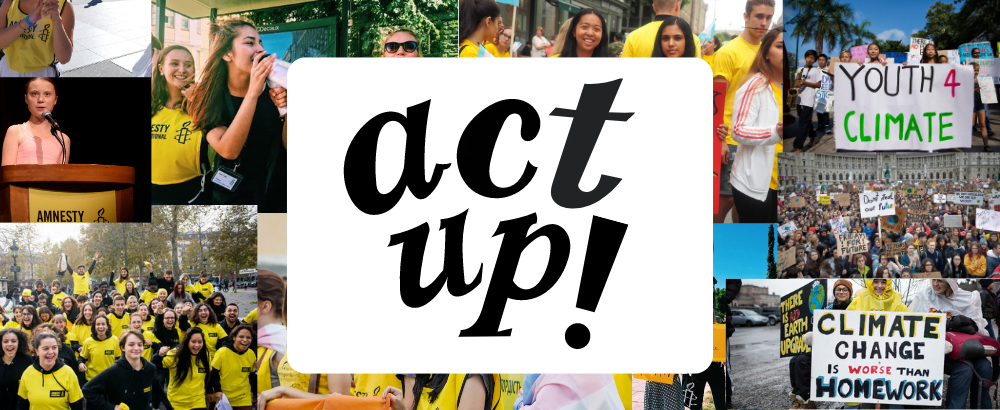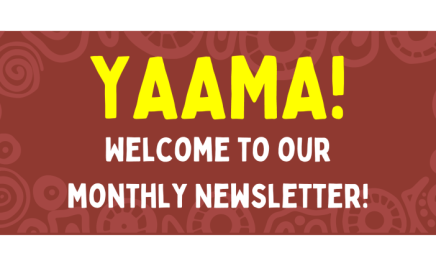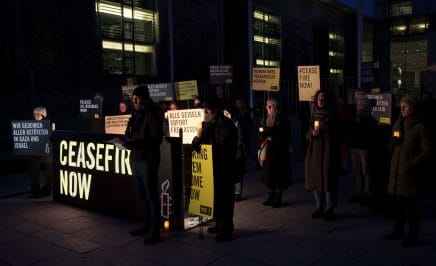Edition 5 | October 2024

Dear fellow activists,
We, the creators of this edition, would like to acknowledge the traditional protectors and custodians of the land on which we write, Amnesty International Australia operates, and where you and I reside. We pay our respect to Elders past, present, and emerging, recognising their resistance in preserving their ongoing stewardship of the land.
In a world where activism is louder and more prominent than ever, some voices still go unheard.
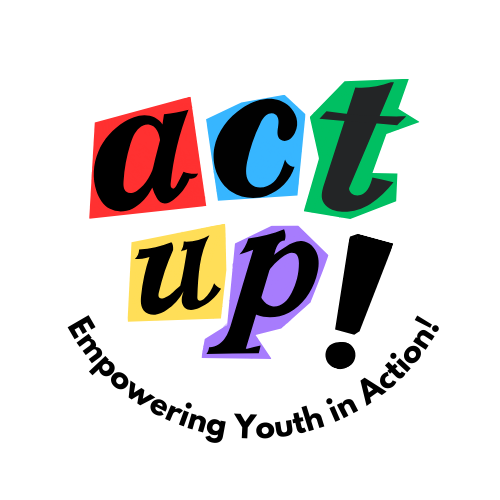
After the amazing feedback from last months edition, we have decided to focus on shedding light on less visible groups in the activist space. Whether it’s due to systemic barriers, intersectional challenges, or simply being overshadowed by more dominant narratives, many groups fight for change in silence.
Our goal is to amplify their stories, recognise their resilience, and ensure their efforts are seen, heard, and valued. From grassroots organisers to marginalised communities whose struggles go unnoticed, these are the voices we’re shining a spotlight on – because every movement needs all its parts to thrive.
This edition delves into the unique challenges faced by activists with mental disabilities, the critical importance of freedom of speech, and, as always, the vital role young people play in shaping the future of our nation.
As Amnesty Youth Members, if you wish to contribute content, join the working group, or have a question, feedback, or general inquiry, please send a message through the form below! We hope you enjoy this edition and look forward to hearing your thoughts!
In Solidarity,
Your Working Group


Learn about what other young people are up to, what they have to say and what they care about in the Amnesty Movement!
Mental disabilities in the intersectionality of human rights activism
Written by Asha Burr (Amnesty Youth Activist/Interim YAG Representative)
Mental disabilities within the activism space have been a call for concern in gaining recognition for this marginalised community through organisation and community mobilisation, calling for representation, accessibility and ending ableism within these spaces. A mental disorder is characterised by a clinically significant disturbance in an individual’s cognition, emotional regulation, or behaviour. This definition is important in understanding how the activism community can best make adjustments and changes to an approach to mentally disabled people within the activism space, making the individual feel comfortable and accepted and encouraged to participate and make changes in areas of passion and knowledge.
Mental disabilities in the activism space have gained increasing recognition and focus in recent years. Activists and organisations are pushing for better representation, accessibility, and awareness in addressing the needs of people with mental health conditions or intellectual disabilities. There has been an evident underrepresentation of mental disabilities within leadership roles due to negative stereotypes and public opinion in which it is assumed that those with disabilities cannot take on these roles in the same way that abled people can. This places a barrier to confidence and accessibility in the assumption that individuals with mental disabilities cannot lead in various roles and responsibilities. Advocates argue for a more inclusive approach by encouraging individuals with mental disabilities to lead in issues of passion and knowledge rather than assuming they cannot be successful in leadership. This also reinforces the idea that individuals with mental disabilities can speak for themselves (self-advocacy) to promote self-actualisation and achievements within the activism space rather than hindering opportunities for the growth and development of skills within activism.
Protests are considered to be one of the central aspects of activism in being an active participant and advocating for change for a cause. However, for many disabled people, it can be a significant barrier to access and participation for a variety of reasons. The physical intimation and proximity of protests can lead individuals with Obsessive Compulsive Disorder and Autism for example to feel physically and emotionally overwhelmed and stressed at protests due to the loud sounds, claustrophobic aspects and the amped-up emotions of the cause. This may lead to ‘episodes’ or panic attacks for those with mental disabilities, therefore strategies such as online activism or bringing someone you trust to a protest with you can lead to accessibility through participating in the cause. Further, those with Post Traumatic Stress Disorder or Generalized Anxiety Disorder, for example, may experience an extreme overwhelm of emotions leading to a panic attack or further medical consequences due to the environment. Therefore that is why it is so important to create safe and supportive environments for individuals with mental disabilities to ensure their comfort and safety.
Intersectionality is vital to achieving the most positive outcomes for neurodivergent people. Mental disabilities often intersect with other forms of marginalisation, such as racism, sexism, and poverty. Activists argue that movements must adopt an intersectional approach to adequately address the complex challenges faced by people with mental disabilities. This is further evidenced within the justice system due to the disproportionate and targeted attacks on individuals with mental disabilities, specifically those of colour. Activists have long pointed out the criminalisation of mental illness, particularly within marginalized communities. Many police interactions that result in violence or death involve individuals in mental health crises, and activists are calling for alternative response systems, such as mental health crisis intervention teams instead of police. At protests, individuals with mental disabilities are further at risk than abled individuals due to different mental capacities and awareness of social cues which can lead to an arbitrary exercise of power, and unlawful and violent attacks, targeting this vulnerable community. A 2018 ABC article highlighted that more than half of people shot dead by police have some sort of mental disorder or disability within NSW.
This shocking but unsurprising statistic leads to an understanding for activists to call for further protection for disabled people and to regulate the power of police officers in their abuse of discretion.
Accessibility and safety for those with mental disabilities within the activism space are highly significant in achieving representation and equality for this marginalised group in promoting their involvement in leadership roles as well as ensuring a safe and inclusive environment is maintained within the human rights activist space. Acceptance, inclusion and accessibility must be maintained and achieved for those with mental disabilities to achieve equality within activism and to solve disparities and gaps for the safety of individuals with mental disabilities. Through community mobilisation and reform from the government, society can be one step closer to the protection of individuals with mental disabilities and neurodivergent people within Australia.
Article by Kate Langley
Amnesty YAG Chair, SA/NT ALC Member, Gaza Rep
Kate here, Youth Advisory Group Chair, SA/NT Activism Leadership Committee member and Gaza Crisis Representative at Amnesty International Australia. Navigating leadership and activism wearing various hats in various organisations, while juggling a full-time job, chronic illness, mental health challenges, and neurodivergence has taught me the importance of balance. The intersection of these identities means constantly finding ways to protect my peace while advocating for human rights in emotionally charged areas like global conflicts and climate change.
For me, prioritizing rest and setting clear boundaries has been essential to avoid burnout. Activism, especially in areas as deeply personal and impactful as disability rights and environmental justice, can be draining. My advice? Know your limits. Take breaks, delegate tasks, and lean on your community when needed. Recognizing that our well-being is just as important as the causes we fight for can make all the difference. We cannot pour from an empty cup, so protecting our mental health and energy allows us to continue advocating for those who need it most. Keep fighting the good fight!
Article by Crystal Du
Amnesty Youth Member
It isn’t everyday you get to write an article for Amnesty. It also isn’t everyday that you get to create a new garden brimming with Aboriginal plants at your school, or hold drives to support the Aboriginal literacy foundation, or be able to have the opportunity to make care packages for indigenous women and children in need. These are just a few of the amazing things that Penleigh and Essendon Grammar School’s Reconciliation Action Plan Group (PEGS RAP) have worked on, or are planning to do.
At the beginning of the year, we each choose a charity to look over for the year. With the ongoing support of our RAP leader and teachers, we have each had a chance to work towards creating betterment for Aboriginal people undergoing different circumstances. Not only that, being able to support other people in such an active and involved way has helped us learn ways to be able to support ourselves and others in groups such as social justice. One of the members, Aayan, wrote a statement on how being part of RAP has actually helped him improve his own wellbeing as well as those of others.
“As someone who has dealt with ADHD, autism and racism I understand how hard it can be to live with people being mistreated and dehumanised. The reason I joined and enjoy being part of the Reconciliation Action Plan was so I could help the Indigenous Australians and others in the fight against racism and be a role model for people who are neurodiverse and reduce the negative stigma about us.”
The PEGS RAP have a beautiful new garden to look back on over the next few years. We worked on it for two days during September. At the end of the two days, a beautiful native flora was planted that grows only around 1 cm a year. One day, some of us will have children that will go to PEGS. We might come back in 10 or 20 or 50 years’ time, to see each extra centimetre on this plant as representative of each year PEGS has continued to spend working towards reconciliation. We hope that the legacy RAP leaves on our school will inspire others to continue working on projects that beautify and bring together our community while continuing to spread the ideas and importance of reconciliation.

Find out what’s happening soon at Amnesty!
✍️ Be part of the world’s biggest human rights event – Write 4 Rights!
Term 4, 2024
How many letters do you think your school community could write for a cause? Host a Letter Writing Marathon with your school to help save lives! For more information and to register to be a part of this important campaign, fill out this super-quick form.
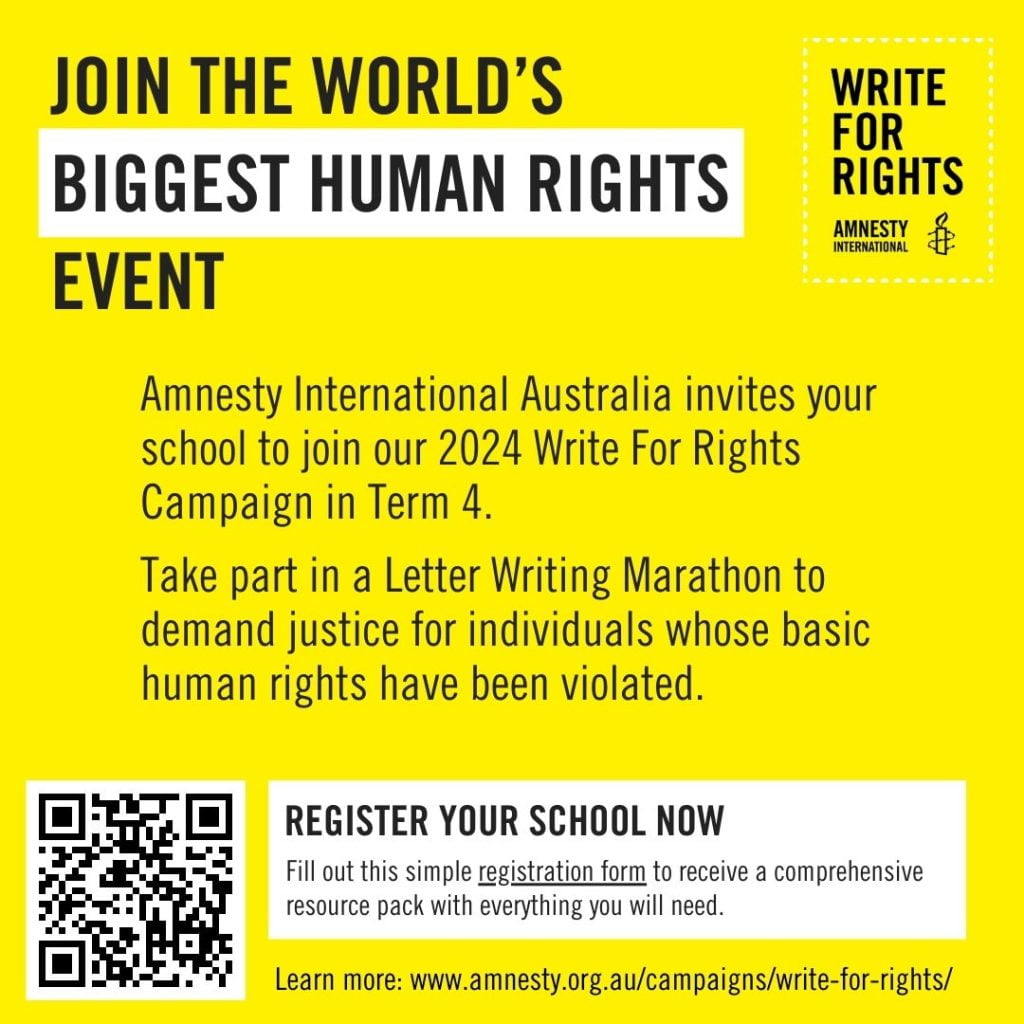
🎧 Listen to the latest episode of ‘Anytime Amnesty’!
In this episode, Amnesty activist, Joe, speaks about his lived experiences and why Australia urgently needs a Human Rights Act to protect Australia’s most vulnerable people.
💌 Come along to our ‘Write for Rights’ Webinar Launch!
📆 Tuesday, October 29th, 2024 @ 7:30pm AEDT
Whether you’re new to Write for Rights or an activist who has been involved before, this webinar will provide you with the tools, resource sand knowledge to create real change through the Write for Rights Campaign this year!

What else can you expect from the Act Up! newsletter?
As a Working Group, we are committed to publishing an edition of Act Up! once a month.
Going forward, here is what you can expect from this newsletter:
- Sharing any UPCOMING OPPORTUNITIES for fun & exciting things that are happening in the movement (i.e. Youth Action spaces, campaign events, rallies/protests, training workshops, Members Forums etc.)!
- YOUTH ACTIVIST SPOTLIGHTS where we will highlight the personal activism stories of youth activists in our movement. Every story is important and valuable so get in touch if you want to share your story!
- Sharing what young people are doing within Amnesty, in their local communities, schools, universities or at Amnesty events in our YOUTH ON THE MOVE section! Get in touch if you have been doing some cool things!
- GET IN CONTACT via the form below to have your say, share your piece or even join our working group!
We want YOU to get involved and share your experiences, stories and creative works in the human rights activism and advocacy space through the Act Up! Youth Newsletter.
Thank you for being comfortable and confident enough to share what you and your community are doing for human rights. See you next month with our next edition!

